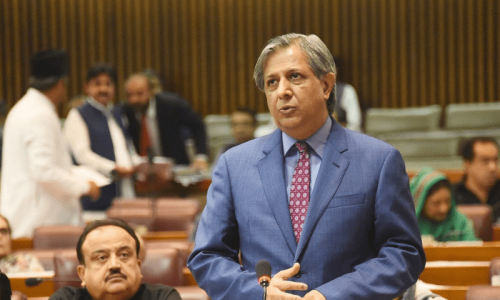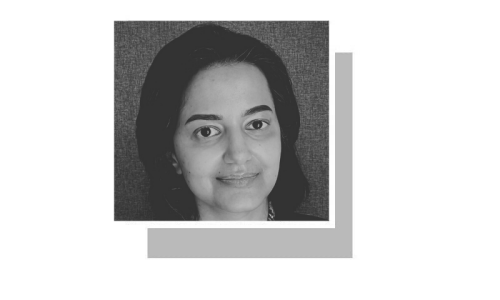 ISLAMABAD, Feb 12: Benazir Bhutto’s last political treatise Reconciliation: Islam, Democracy and the West was launched here on Tuesday with the main leadership of the Pakistan People’s Party (PPP) missing from the event organised at a local hotel.
ISLAMABAD, Feb 12: Benazir Bhutto’s last political treatise Reconciliation: Islam, Democracy and the West was launched here on Tuesday with the main leadership of the Pakistan People’s Party (PPP) missing from the event organised at a local hotel.
A lonely Sherry Rehman was the main speaker at the posthumous launch which was otherwise attended by a large number of local and foreign journalists, diplomats and members of the civil society.
Speaking at the ceremony, Ms Rehman on her own explained that a lot of party leaders wanted to attend the function but could not because they were on the campaign trail in their constituencies as the election was round the corner.
She said the launching ceremonies of the book would also be held in Washington and London.
The speakers, including an author, a journalist and a former bureaucrat, paid rich tributes to Ms Bhutto for her struggle for the cause of democracy and threw light on various topics highlighted by Ms Bhutto in her last book, which she had completed just few weeks before her assassination on December 27, last year after a public meeting at Liaquat Bagh in Rawalpindi.
Ms Rehman said it was not an ordinary book as it had been written by an extraordinary politician.
She said Ms Bhutto’s book was an appeal to understand the world from where she was. She said it was true that Ms Bhutto talked to the regime but she only wanted a level playing field for all the political players and a free and fair election in the country.
Ms Rehman said the former prime minister had returned to Pakistan to save the country.
“You can tell by its pages that she was a woman in a hurry, and that she planned to save Pakistan from the fires of extremism and dictatorship, poverty and ignorance that had driven this country to the brink of a new abyss,” she said, adding that Ms Bhutto’s most powerful argument was about the West’s ambiguous relationship with democracy outside its own shores.
According to Ms Rehman, the slain PPP chairperson had identified the twin challenges of democracy and dictatorship as the real and present danger to Pakistan’s survival.
She said Ms Bhutto looked to out-of-the box solutions using several international examples to set up a Muslim investment fund to power the growth and enlightenment so badly needed in the Muslim world.
Ms Bhutto had written in the book’s last chapter that ”targeted economic development can help reduce poverty and violence in Muslim majority areas”.
“In trying to save her country, in trying to reconcile the world, she gave her own life. So Shaheed MBB, you are not just alive and speaking of issues that are critical to Pakistan, you are alive in this philosophy of peace and reconciliation,” Ms Rehman said.
Former foreign secretary Tanvir Ahmed Khan said if Benazir Bhutto’s life had not been tragically cut short, the publication of this book would have been a major event.
He said in the book, Ms Bhutto had spoken of “eight lonely and difficult years of exile.”
He also recalled his meeting with Ms Bhutto in Dubai last year and said that it was evident that she was not going to be content only with talking to her people from outside.
Mr Khan said Ms Bhutto believed that Islam was a great religion and could not be abandoned to the forces of darkness. In these writings, he said, Ms Bhutto stated in her concluding chapter, “I have tried to trace the roots, causes, and potential solutions to the crisis within the Muslim world and the crisis between the Muslim world and the West. My premise, from the beginning, has been that extremism thrives under dictatorship and is fuelled by poverty, ignorance, and hopelessness.”
He said in her book, she had asserted that fundamentals of democratic governance were part of the Islamic value system. The readers would probably be impatient to reach her account of the secret parleys with Gen Musharraf, he added.
He said she avoided value judgments but her narration implied that the Musharraf regime had no ethical framework for negotiations which consequently suffered from a perennial trust deficit.
The former secretary said Ms Bhutto revealed that there was an ongoing dialogue between PPP and the Musharraf regime from the very outset of his rule which did not get anywhere because she wanted a roadmap for the restoration of democracy.
In 2001, and again in 2002, he said, she was offered the release of Asif Zardari in return for her quitting politics. Later, she was asked to opt out of the next election. In August 2006, Gen Musharraf had come under western pressure to broaden his political base and he phoned her when she was in New York. The PPP agreed to support the bill on women’s rights. Gen Musharraf met her in UAE in January and July 2007 after reassuring her that a strategic decision to elicit political participation had been taken. She presented a list of demands, including Musharraf’s retirement from the army, impartial election commission for elections under international monitoring, participation in election of all parties and leaders, lifting of ban on twice elected prime ministers, dropping of charges against political personalities and reconsidering division of powers between the president and prime minister, Mr Khan said.
He said Ms Bhutto wryly noted that the meetings had “gone too well” and Gen Musharraf seemed to accept every demand. In July 2007, he asked for PPP’s support for reducing the age of retirement of judges but she declined to extend it.
In August, he said, Amin Fahim gave Gen Musharraf a detailed non-paper. He said the book did not adequately cover the interaction with the Musharraf regime after she returned to Pakistan, though it brought out vividly her dismay at the developments of November 3 and the issue of personal security.
Renowned author Ahmed Rashid said Ms Bhutto wanted the West to equally play its role and share the responsibility in bridging the gap between them and Islam.
He said that the nation was still living in a situation that developed on November 3 when Gen Musharraf imposed emergency in the country.
He said they had not seen any signal from President Musharraf or the new army chief that the army was ready to accept the sovereignty of the parliament and real transfer of power to the people. He also criticised the West’s policy of supporting Jehad in Afghanistan. He claimed that Taliban chief Mullah Omar was presently living in Quetta.















































